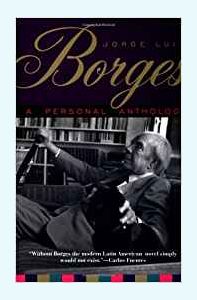After almost a half a century of scrupulous devotion to his art, Jorge Luis Borges personally compiled this anthology of his work-short stories, essays, poems, and brief mordant 'sketches,' which, in Borges's hands, take on the dimensions of a genre unique in modern letters.
In this anthology, the author has put together those pieces on which he would like his reputation to rest; they are not arranged chronologically, but with an eye to their 'sympathies and differences.' A Personal Anthology, therefore, is not merely a collection, but a new composition.
Reviews:
Borges wrote his first short story at age six and, amazingly, at the age of nine translated Oscar Wilde's short story "The Happy Prince" from English to Spanish, publishing the story in a local newspaper. It was simply assumed that his father (also "Jorge Borges") had done the translation. Borges was educated in the classics, was multilingual, and was eventually named Director of the National Library of Argentina. The irony of being blind - and also in direct control of "800,000 volumes" did not escape him.
This book was assembled by Borges himself, in the 1960s. It's an assortment of short stories, essays, fictions and nonfictions, and poems. It is a demanding and rewarding read. Like most of his work, his human subjects here are mainly males- of history, myth, and his own invention. Women are not much included in his oevre. I add that so that readers new to Borges are informed, in advance.
He does not court the reader so much as respect readerly intelligence. As such his work sometimes initially intimidates students - and later, thrills. It stays with you, permanently.
Borges was a master of several forms, and they are here. Most of his areas of interest are 'big' themes : art, poetry, mortality, loyalty, destiny, ancient and world history. (He even wrote articles about books or other articles that, in fact, did not exist - other than for his express purposes.) In his poetry and other pieces, notions of eternity versus mortality (for example: one's knowing that one will never again open a certain beloved book, travel a familiar street, or know or see a still-living loved one) is approached with profound humility and grace. There are meditations on a variety of men and topics, among them Shakespeare, 'the Aleph,' and Shih Huang Ti, the Chinese emperor who ordered that the Wall of China be built, and "likewise ordered all books antedating him to be burned."
Borges loves details, material culture, and even minutiae, too. There is much to hang on to in these pieces. It's a deliberate and purposeful sampling of some of his work - not a "best of," since one volume of 200 pages can't really do that. His writing demands full engagement. Many of his stories lack characters of romance, drama, or overt emotionality - but have great power nonetheless.
Several of his most well-known poems are included. "The Art of Poetry," as able an explication of the meaning of art, life, and eternity as you might ever read and "The Tango," a poem about (among other things) Argentina ("The South, behind suspicious walls,/Keeps a knife and a guitar." In conclusion: "An impossible recollection of having died/ Fighting, on some corner of a suburb.")
Borges is considered to be a modern master, and this collection illustrates why.
Product details
- Paperback: 224 pages
- Publisher: Grove Press; 1st Edition Thus. edition (Jan. 24 1994)
- Language: English
- ISBN-10: 9780802130778
- ISBN-13: 978-0802130778
- ASIN: 0802130771
- Product Dimensions: 13.7 x 1.5 x 20.9 cm




























.jpg?t=1681121806)






